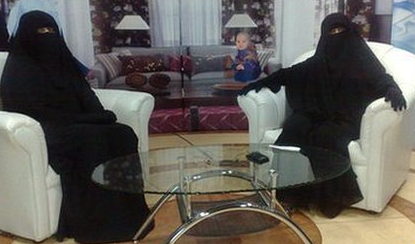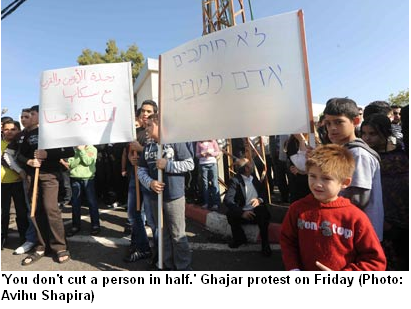The Max Pam Globe
- Sinds 1998
- 23-04-2024
- @maxpam1 volgen © Max Pam
Onbevlekt krijgt niemand hem omhoog
HUMAN
ONBEVLEKTE ONTVANGENIS EN DE MAAGDELIJKHEID VAN MARIA
Het is goed om, nu kerstmis naakt, nog eens het verschil tussen beide dogma’s uit te leggen. Maar eerst het volgende IKON-bericht, zoals het stond op Kerknieuws:
De maagd Maria ligt in bed met Jozef en kijkt biddend naar boven. Jozef naast haar kijkt teleurgesteld. De afbeelding gaat gepaard met de tekst: ‘Arme Jozef, het is moeilijk God te volgen’. Het is reclame van een Nieuw Zeelandse kerk. Veel gelovigen vinden het ongepast.

De afbeelding staat op een billboard tegenover de anglicaanse kerk van Sint-Matthew-in-the-city. De liberale kerk wil met de afbeelding mensen aan het denken zetten: “Over het kerstverhaal en over het wonder van de maagdelijke geboorte.”
Katholieken in het land zijn allerminst blij met de reclame, want de bedscène zou juist suggereren dat er geen sprake is van een maagdelijke geboorte. De kerk probeert dit inderdaad aan de orde te brengen: “Is die geboorte een wonder? Of is het juist een wonder dat Jezus zich liet omringen door de armen van de wereld?” De kerk wil daarmee het christelijke handelen (zoals naastenliefde) boven het geloof in bepaalde wonderen stellen.
“Dit is een actie die we verwachten van atheïsten die ons belachelijk willen maken”, zo laat een woordvoerder van het bisdom Auckland weten. Een andere gelovige die niet blij was met de billboard, bekladde de afbeelding met verf.
Wat is nu de Onbevlekte Ontvangenis?
De Wikepedia zegt het zo: “De Onbevlekte Ontvangenis van Maria is een dogma van de Katholieke Kerk dat met een hoogfeest gevierd wordt op 8 december, negen maanden voor het feest van de geboorte van Maria op 8 september. Het dogma bevestigt de bijzondere status van Maria door te stellen dat zij verwekt werd en ter wereld kwam zonder met de erfzonde te zijn bevlekt. Zij werd in de schoot van haar moeder ontvangen, met andere woorden, met een onbevlekte ziel. Op haar ziel werd door God reeds tevoren de zuiverende werking van de toekomstige verlossing door haar Zoon Jezus Christus toegepast. Volgens de katholieke geloofsleer bracht de bijzondere uitverkiezing van Maria met zich mee dat zij de enige mens in heel de geschiedenis is wier ziel nooit met enige zonde bevlekt geweest is, zelfs dus niet met de erfzonde”.
Dat is dus iets anders dan de maagdelijkheid van Maria, overigens ook een dogma.
De Wikepedia zegt hier: de maagdelijke geboorte betekent in engere zin dat Jezus zonder toedoen van een man uit Maria is geboren. In bredere, katholieke en orthodoxe zin gaat zij niet alleen uit van de maagdelijkheid van Maria voor en tijdens de geboorte van Jezus, maar ook na de geboorte. De maagdelijke geboorte van Jezus wordt op Kerstmis gevierd. In het katholicisme en de orthodoxie is het een belangrijke leerstelling die zowel in de De twaalf artikelen van het geloof als de Geloofsbelijdenis van Nicea-Constantinopel is opgenomen.
Beide zijn overigens katholieke dogma’s. De protestanten zien niet veel in de Maria-verering.
NIEUWE TALSHOW OP SAOEDISCHE TV. GAAT DAT ZIEN!
Het BBC-nieuws maakt melding van een nieuwe talkshow met de volgende twee presentatrices.

Hier de eerste alinea’s van het bericht:
Until recently you would never have seen women presenting television programmes dressed from head to toe in the niqab or burqa. But on the Saudi religious channel Awtan TV it has now become the norm.
Female broadcasters at the station are draped in the all-enveloping dresses, which are usually black and also cover their faces.
The work environment too is very different. Male technical assistants do not enter the studio while the women are presenting.
There are more than 60 religious channels across the Middle East. Some allow women to present programmes without being fully covered or dressed in black.
Others have no women presenters at all.
Awtan TV decided to take a unique approach. The station was launched in 2008, and last month it set a precedent by allowing women to present, but only on the condition that they wear the niqab.
Ola al-Barqi anchors a breakfast show, as well as a quiz show for girls called Mosabqat Banat.
A key element of the programme is the relationship built between presenter, contestants and the audience – something that might be more difficult if the presenter is totally covered up.
“The face is not the only way to build a relationship,” explains Ms Barqi, speaking to BBC Arabic.
“We’re always receiving calls from viewers in various countries encouraging us to keep doing what we do.”
And, as Ms Barqi points out, women are not just confined to the studio at Awtan TV.
“We report from the field in the niqab and it does not stop us from doing anything.”
Wahhabism, the strain of Sunni Islam that is officially practised in Saudi Arabia, is considered one of the religion’s most conservative forms.
Some critics say that Awtan TV is restricting women’s freedom by making it compulsory to wear the niqab if they want to be presenters.
Gelukkig dat de presentatrices naar eigen zeggen niet gehinderd worden door hun kleding, maar uitgedaagd. Toch lijkt het een beetje op de vrouwelijke variant van de Ku Klux Klan.
LIEVER BEZET IN ISRAEL DAN VRIJ ONDER HEZBOLLAH.
Op de grens van Israël en de Golan ligt een plaatsje genaamd Ghajar. Deze plaats werd tijdens de 1973 oorlog door Israël op Syrië veroverd en in 1981 geanexeerd. Iedereen kreeg Israelisch staatsburgerschap en was daar tevreden mee.
Maar helaas.
De VN vond het een uitermate strak plan het noordelijk deel aan van Ghajar aan Libanon toe te kennen. Hezbollah er bovenop gedoken en eist terugtrekking van Israel uit “Libanon”: Wij lazen op ynetnews het volgende bericht:
Ghajar residents: Prepared for death, not division
Some 1,800 residents of village on Lebanese border protest unconfirmed reports of plans to hand over northern part of village to UNIFIL control. ‘Berlin Wall already fell, and no similar wall will be erected here,’ they say
Some 1,800 residents of the village of Ghajar, which sits on the border between Israel and Lebanon, protested Friday against the decision published in as-of-yet unconfirmed reports to divide the village and hand over its northern section to UNIFIL control. The demonstrators marched through both sections of the village in protest of the plan.

Council and residents spokesman, Najib Hatib, said to Ynet that the residents are determined to prevent the division of their village and UN entry into the village. “We are prepared to die, but this division will not come to be,” he said.
In recent months, there have been many discussions in the political echelons on the future of the village, which is currently entirely under Israeli sovereignty, during which the defense establishment suggested that the option of transferring the northern part of the village to the UN be weighed. Yet, thus far, no decision has been made on the issue.
This week, it was reported that a decision was made during recent discussions of the issue to transfer responsibility for the northern section of the village to UNIFIL control by the end of January, but no official confirmation of this has been made. Last month, a Lebanese newspaper reported that Israel “is prepared to withdraw from the village within a matter of hours.”
The demonstrators on Friday also said they don’t know if and when the plan will be carried out.
“The implication of division is splitting families and people that have always lived together,” added Hatib. “The implication is blocking the residents from their land, which stretches over 1,500 dunams (370 acres). We are not willing to build a wall in the middle of the village. The Berlin Wall was already taken down, and there will not be another wall like that here.”
Hatib complained that the government has not informed the residents of its intentions and they are left in the dark regarding their future. “We are fed by the media,” said Hatib. “We have not heard any reliable information on what is going to happen here. It is a shame that there is such a disconnect.”
Hatib added that the residents are considering their next steps, which may include a petition to the High Court.
Arme inwoners van Ghajar. Gelukkig maar dat Dries van Agt daar niet langs komt.
Humanistische Omroep, 18 december 2009